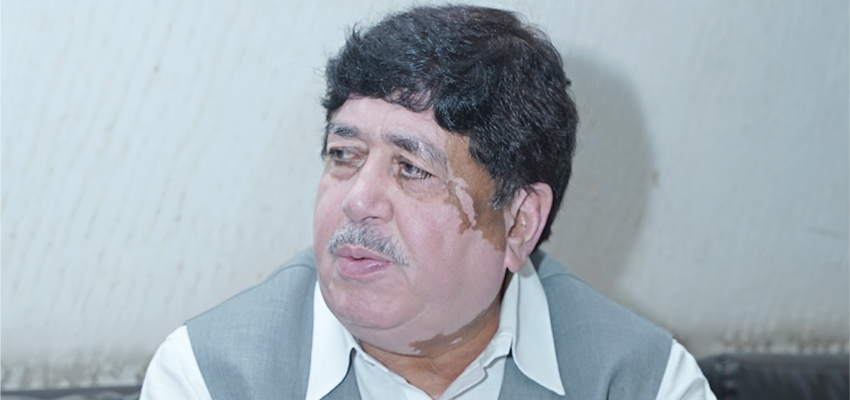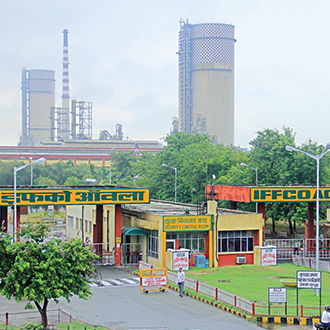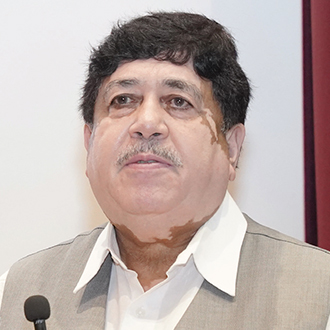Taking the co-operative industry by storm

Corporate Citizen takes you on the journey of the National Cooperative Union of India (NCUI) through the eyes of Dileep Sanghani who is the Chairman of NCUI, as well as Indian Farmers Fertilizer Cooperative Limited (IFFCO) and the Gujarat State Co-operative Marketing Federation Ltd. (GUJCOMASOL). Sanghani was also the former Member of Parliament (MP) from Gujarat
"IFFCO helps farmers by connecting them with government schemes, to provide them with necessary benefits. This support for farmers involves aid from various sectors. NCUI serves as the top organisation among these bodies and helps everyone"
- Dileep Sanghani
Corporate Citizen: Tell us about the National Cooperative Union of India and how have you been in the cooperative sector?
Dileep Sanghani: The National Cooperative Union of India (NCUI) is the apex body for 8.5 lakh cooperative societies in India. Right from primary cooperative societies, it works at different levels, including local, district, state, and national. It started in pre-independence India, and its structure changed post-independence. Currently, NCUI is focusing on education, skill development, and training; to create new cooperative societies in various fields like banking and agriculture with the help of state cooperative societies. The Central Government also supports these cooperative projects through NCUI.
As for my background in the cooperative industry, I have been involved in it for a long time. I was the Cabinet Minister in Gujarat and worked in cooperative banks. I also served as the chairman of the National Federation of State Cooperative Banks Ltd. (NAFSCOB) and worked with the National Agricultural Cooperative Marketing Federation of India Ltd. (NAFED). After all these experiences, I became the Chairman of NCUI.
CC: How did you tackle the workings of the cooperative sector on such a large scale?
In order to manage such large-scale companies, it is important to adopt a big-picture mindset. Even now, we are making efforts to expand our operations internationally. It is very important to start thinking on a larger scale as your workload continues to grow.
CC: Tell us about your views on the cooperative movement in India and its emerging issues.

Friedrich Wilhelm Raiffeisen from Germany formed credit unions in 1862. After that, Britain conducted the survey, and it came to India in 1904. Even today, the society that was formed in 1904 is still visible in the country. But after independence, the cooperative movement underwent several changes. But the central government did not have a separate cooperative ministry.
I was also the Minister of Agriculture of Gujarat at that time. When he became the Prime Minister, he saw that, due to Covid-19, poor people who worked hard weren't getting enough food. So, he started providing government food assistance to everyone. Later, he noticed that people were struggling to find work, and the problems increased. He had to provide food to about 17 crore people. This showed the need for the country's economic recovery, as they couldn't contribute to the nation's economic development. Those who do have enough food to eat, what will they give to the country? This highlighted the importance of economic development for the entire population. That's why he introduced the Jan Dhan account scheme, which allows people to open zero-balance bank accounts and encourages them to participate in the scheme.
The government started providing financial aid directly to their bank accounts under the Jan Dhan scheme. They also created a new cooperative department and provided loans for education and skill development to those who wanted to start a business in any field. The government has also given the slogan "Sahkar se Samriddhi," which literally means prosperity through cooperation.
The goal of this scheme is not just to help the person grow but also to encourage them to contribute to the economy. When people work and pay taxes, they support the country's economy. It may seem like an individual's growth leads to the country's development because, as they grow, they start paying taxes that go into the country's treasury. So, the country develops as the individual prospers.
Cooperative development is the key to increasing the country's prosperity. The government is providing opportunities to the unemployed, those who have not had the chance to work, or those who lack a business. The government is working through NCUI to ensure that these opportunities reach even the last person in society.
"The government has made a lot of efforts to help people get jobs and provide jobs to others. They will also contribute to the economic growth of the country"
CC: How do you network with the state run cooperative societies?

There are two types of laws in the country - the Multistate Co-operative Societies Act for those who operate across different states under the central government and the State Co-operative Societies Act for those working within a specific state. Each state has its own law, but to collaborate, they need to create bylaws. Initially, there were several amendments to the constitution regarding these bylaws, but the Supreme Court didn't approve them. Subsequently, the central government decided that state cooperatives should work together in the country. To create model bylaws, the central government asked for public suggestions in 17 languages for six months. A committee, of which I was a part, was formed to draft these bylaws, which were then sent to the states.
If a state government accepts these bylaws, they automatically become applicable in that state. The central government changed the law, leaving it to the state governments to decide whether to adopt it. So far, more than 27 states have accepted it, as these bylaws were developed based on everyone's suggestions. If all states accept these bylaws, everyone will equally benefit from them.
CC: What is the present avatar of the co-operative movement in India in the present scenario?
You can achieve your dreams with the help of the cooperative industry. I’ll explain with an example: After completing my graduation, I had my father's farm to work on, but it wasn't strong enough. I didn't want to work for someone else; I wanted to start my own business. So, in 1976, I took a ` 5,000 loan from a cooperative bank for the same.
However, I faced many challenges with the bank, and their responses were not very helpful. That's when I decided to become a loan provider to those in need rather than just a borrower. I started my own cooperative society called Sanghani Credit Co-operative Society and began providing loans. Over the years, the society has grown, and we now operate from a three-storey building. I'm the founder chairman, but eligible individuals have taken over as the society chairman now.
All of this started with the simple idea that I wanted to give loans instead of taking them. We have now reached the district, state and national levels. So, if you think about your goals and work towards them, you can achieve success.
Similarly, I served as a Member of Parliament four times, a Member of the Legislative Assembly thrice, and a Minister twice. During my tenure in these roles, I reflected on my contributions to the area. I provided loans, built roads and ensured good water supply. But what did I do for employment? The youth needed jobs, and I wanted to create employment that did not require any specific qualifications.
I did some research and found the dairy industry to be a source of employment that didn't require specific qualifications. I made a plan to facilitate bank loans for people interested in dairy farming. By getting into this business, one can purchase animals, set up a dairy, and earn income easily. As a result, we established the Amreli District Cooperative Milk Producers' Union, where I served as the founder chairman and later passed the role to someone else. Then I continued to explore ways to create jobs and realised that I could provide loans to the workers. I am happy that this dairy business has provided employment to over 30,000 women in Amreli. Hence, if you have a clear goal, you will automatically find a way to achieve it.
"Despite our differing backgrounds and political beliefs, we all share a common ideology of cooperation, which is rooted in the principles of humanity and working together for the greater good"
CC: Are only women working in the dairy industry? How much advantage have women been given by your ministry?

Yes, more than 30,000 women work hard in the dairy industry; although there are men working in the field as well, their number is comparatively lower. I recall an incident from several years ago when I was the chairman of my bank in Amreli. A journalist asked me what the cooperative industry had done for women. At that time, women seeking loans for their businesses were charged an interest rate of 14 per cent. However, with Raksha Bandhan approaching in just 10 days, I came up with a special proposal and lowered the interest rate to 8 per cent for women who needed financial assistance to start a business. I named this initiative the "Rakshabandhan Yojna."
However, today, women are getting loans at rates even lower than 8 per cent. This incident happened about 20 years ago.
CC: What is the net worth of the Cooperative Ministry?
The survey is ongoing, and I think it could be larger than any private sector. Currently, the government is in the process of collecting data through this survey, and it should be completed in the coming months.
I don't have the exact numbers yet because the government is still gathering the data. I believe it will be ready in about a month or two. The NCUI is also involved in data collection. The government is collecting information about the number of society members, but we haven't received all the data yet. The cooperative's net worth is considerably high. Additionally, collecting data from companies like Amul, IFFCO, etc. will provide a comprehensive overview of the entire country. Each sector's data will be collected separately.
CC: Tell us about the National Cooperative University. What kind of training will be provided here?
The central government created and announced the plan. The responsibility of running a cooperative department is yet to be decided. NCUI has stepped up to take on this responsibility. However, various organisations have expressed their willingness to run it, including the central government. But what matters most is that it gets done. The cooperative department has sent the file to the Prime Minister's Office (PMO), and they will decide who will look after the department.
The university will provide training across various sectors, which will help the youth pursue their ideas. It will provide training for every field, whether it's related to running a sugar or milk cooperative, in order to develop entrepreneurs. Education at the university will cover both practical and theoretical aspects, offering a wide range of subjects for young students. There are no restrictions on who can study there, as undergraduate, graduate, and professional students are all welcome to pursue courses at the university.
CC:There are different governments in different states. In Maharashtra, the sugar cooperative is very strong. How do you handle this network, especially with so many political differences?
The cooperative organisation in India represents an ideology for the country. It's a platform where people from various political groups, castes, languages, and religions can come together to work towards a common goal, which is the betterment of the nation.
I’ll explain with an example: I am a member of the Bharatiya Janata Party (BJP). When I became the chairman of the Multi-State Cooperative Societies, there were three BJP members on the board. My proposal was submitted to the Congress group, and I gained support from the Akali Dal of Punjab, which led to my appointment as the chairman. When I joined the National Agricultural Cooperative Marketing Federation of India Ltd. (NAFED), there were six BJP members, while the rest of the members were from different parties. Yet, I was elected to NAFED.
When I came to Krishak Bharati Cooperative Limited (KRIBHCO), there were only two people from the BJP at that time. Even with the majority being from different political backgrounds, I still became the chairman. Currently, Dr. Chandra Pal Singh Yadav is the chairman of KRIBHCO. Despite our differing backgrounds and political beliefs, we all share a common ideology of cooperation, which is rooted in the principles of humanity and working together for the greater good.
"The central government's 'Sahkar se Samriddhi' slogan is a great opportunity for people who need jobs, security, and benefits. They have made 52 different policies for the new department of cooperatives. I appeal to young people to join this cooperative sector"
CC: You mentioned that you work actively for farmers. What is the contribution of NCUI to agriculture?
NCUI is not limited to a specific sector; it is a service sector. People who seek training can be farmers from a state or a cooperative society, and their training is done through IFFCO. On the other hand, NAFED is open to all. When a farmer's income is low, the state government purchases their produce at the support price. IFFCO helps farmers by connecting them with government schemes to provide them with necessary benefits. This support for farmers involves aid from various sectors. NCUI serves as the top organisation among these bodies and helps everyone.
"I am happy that the dairy business has provided employment to over 30,000 women in Amreli. Hence, if you have a clear goal, you will automatically find a way to achieve it"
CC: The cooperative banks are known as the most corrupt. Many people have been financially drained. What is your take on that?

First of all, this is the wrong notion about cooperative banks. There are two types of cooperative banks - the urban co-operative bank and the rural co-operative bank. The rural co-operative bank is for the farmers in the village. It is also called the agricultural bank. The urban cooperative bank is for the city. It is for the traders and the farmers. The urban cooperative bank has problems. The rural cooperative bank has no problems.
For instance, rural cooperative banks lend a maximum of `3 lakhs to farmers, who mortgage the land worth `30 lakhs in the bank. It's risky if they can't repay, their successors or family can settle the debt. Urban banks pose different problems. If someone with a shop takes a loan of `15 lakhs of machinery and can't repay it, the bank may only recover `6 lakhs from an auction
However, if we consider an urban cooperative bank—for example, a person owns only one shop. He purchases machinery worth `10 lakhs, and he has taken a loan of `15 lakhs and hasn’t paid the amount. Hence, the bank will get the amount through the auction and will be able to recover not more than ` 6 lakhs.
I still remember an incident with a senior citizen aged 70 who approached me regarding a loan he had taken 20 years ago from our bank. He was struggling to repay and wished to sell his land after settling the deficit of ` one lakh. The man said, "I borrowed money from your bank 20 years ago, and now our current situation has deteriorated to the point where we can't repay the loan. I'm getting older, and I'm not sure how much longer I'll survive. I don't want to pass this loan burden to my children. However, even after selling all the land, there will still be a `1 lakh deficit in the bank. So, if you could reduce my bank deficit by 1 lakh rupees, I'd be able to settle my debt.”
This noble thought can only come from villagers. In order to help him, I unofficially reduced the deficit by `2 lakhs so that he could sell his land and pay the bank. So, he still had 1 lakh rupees remaining. I kept that money in his wife's name. While it may have been ethically right, it was not lawful. Still, I believed it was the right thing to do.
CC: What do you want to say to the people who want to join the cooperative industry?
I want to suggest that the central government's 'Sahkar se Samriddhi' slogan is a great opportunity for people who need jobs, security, and benefits. They have made 52 different policies for the new department of cooperatives. I appeal to young people to join this cooperative sector. It is an opportunity for them to find jobs and even create jobs for others. Women should also join the cooperative field. The government has made a lot of efforts to help people get jobs and provide jobs to others. They will also contribute to the economic growth of the country.
CC: What is the strength of cooperative movement against the backdrop multinationals in the country?
In the past, we protested by burning things during the independence movement. Nowadays, foreign companies have entered our country quietly. However, cooperatives provide a way to avoid relying on them. Through the cooperative movement, we will be able to accomplish anything, which helps keep money within our country. For the economic development of the country, we should promote the ideology of cooperation.